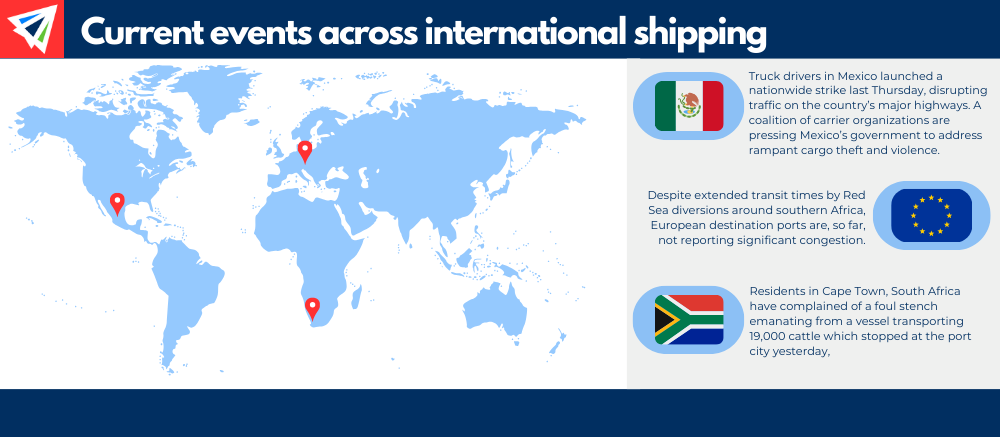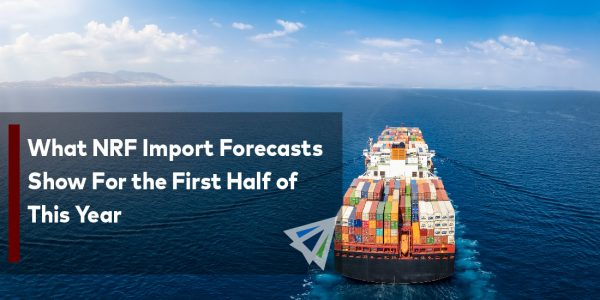Competitive Edge
February 21st, 2024
Stay Current with InterlogUSA
Latest Industry Happenings and Market Updates:

IMPORT: Asia to North America (TPEB)
Recent Developments:
- [Port of Houston] Courtesy of an email notice from Maersk, the Gulf Coast port has announced plans for implementing two “Dwell Fees” as it looks to relieve longstanding imports at container terminals.
- The two fees are the “Sustained Import Dwell Fee” and the “Excessive Import Dwell Fee”. Both charges are the responsibility of the cargo owner with the port not granting any exceptions. Contact us for more information.
- Pre-Lunar New Year bookings for Chinese imports were well above last year’s levels, according to an index from FreightWaves SONAR.
Rates: Rates remain elevated and disproportionately higher on containers bound to the East Coast.
Space: Space is mostly open but has seen some tightening.
Capacity: Longer transit times around southern Africa (to avoid the Red Sea) are absorbing vessel capacity. However, carriers remain well-supplied with available vessels to manage the adjustment.
TIPS:
- Hold your logistics partners accountable for frequent updates regarding current market conditions and routing impacts.
- Be flexible and adaptive to alternative service options, especially as it relates to potential savings on cost or transit.
IMPORT: Europe to North America (TAWB)
Recent Developments:
- Europe’s three largest container ports—Rotterdam, Antwerp, and Hamburg—have all reported sharp declines in volume for 2023. Their performances reflect a broader theme of economic anemia looming over Europe.
Rates: Rates have risen since the start of the month, but given the ongoing spell of dormant demand, this increase will likely be reeled in.
Space: Space is open.
Capacity: Capacity remains abundant. Carriers are partially curbing this by reducing the size of vessels operating on transatlantic lanes. Though, significant blank sailing programs have not been implemented.
Equipment: Availability on both origin and destination sides, unless advised otherwise.
TIPS:
- Book at least three weeks prior to the ready date.
- Communicate with your logistics partners to ensure that you’re up to speed on the EU ETS program and its evolving impacts on transatlantic trade.
- Keep an eye on carrier discretion when it comes to their managing of the market. While this trade favors shippers at the moment, carriers could become more aggressive with tactics, like rate increases or blank sailings, to prevent further lossmaking.
EXPORT: North America to Asia
Rates: Rates have risen in mid-February.
Capacity: Space remains open, particularly from West Coast ports, however carriers remain curbing capacity via blank sailings and slow steaming as U.S. import demand remains challenged.
Equipment: Barge services in China are temporarily suspended for the LNY holiday period.
TIPS:
- Insufficient communication with sailing schedules can lead to higher detention and demurrage fees as well as higher trucking and storage costs. Ensure your logistics partners are not keeping you and your cargo in the dark.
Freight News
Georgia Ports Authority Breaks Export Record for the Third Straight Year
In 2023, exports from Georgia saw a record breaking $49.7 billion in trade – per the Georgia Department of Economic Development.
This isn’t new for the state of Georgia as this is the third straight year Georgia has seen exports reaching record breaking numbers.
Some of the leading export markets for Georgia last year were Canada, Mexico, China, Germany, and Singapore. Aerospace products were Georgia’s top export followed by motor vehicles and agricultural exports.
Oakland's International Container Terminal Adds Overnight Shift to Clear Slight Backlog
Oakland’s International Container Terminal (OICT) expects their nine vessel backlog to clear within two weeks, according to the JOC. They are temporarily adding a third “hoot” shift to each day in an effort to get the backlog cleared.
A “hoot shift” is a term widely used on the West Coast to describe a work shift taking place between 3 A.M. – 8 A.M.
Ed DeNike, President of SSA Containers, cites a weather-related electrical outage causing two ship-to-shore cranes to shut down, and a decrease in worker productivity on Super Bowl Sunday, for contributing to the backlog.
DeNike also told the JOC that this backlog is not due to any pre-Lunar New Year surges of cargo.
Watch January's Webinar!
TOPICS: The State of Global Trade
– Updates on the Red Sea/Suez Canal and the Panama Canal
– Rates/Capacity, routing options, and how all, or any, of this impacts you.
We'd Love to Hear From You
Do you have an industry topic you’d like our experts to discuss in future webinars?
Let us know by clicking the button below to fill out a form or send us an
email at: support@interlogusa.coom
Interlog  Insights
Insights
In last week’s insights, we discussed how some carriers have resumed certain transits through the Panama Canal. Plus, we talk about the Port of Montreal and how it’s at the epicenter as potential strike actions loom over the second busiest port in Canada.
If you’d like to view those insights, we’ll send you a copy. Email us at: support@interlogusa.com
This Friday at 10am CST our week four February insights will be going out to those who have subscribed. Click the button below to sign up.
Sign up for our
industry answers
Our team works to provide valuable, unique, and relevant content to assist you in finding solutions. Sign up now.

